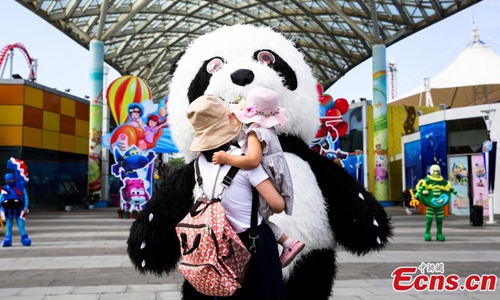Hubei's economic recovery in focus
By Zhang Dan and Yin Yeping Source:Global Times Published: 2020/5/26 22:03:40
Pilot FTZ to boost virus-hit province: CPPCC members

Tourists are seen at the Happy Valley Wuhan theme park in Wuhan, central China's Hubei Province, May 19, 2020. Happy Valley Wuhan, a theme park which had been closed due to the COVID-19 outbreak, has partly reopened. Still, there is a limit on the number of visitors and online pre-booking is required. (Photo: China News service/Zhang Chang)
Supporting the economic recovery of Central China's Hubei Province, which was hit hardest by the coronavirus outbreak, goes beyond showing appreciation for the vital contributions and enormous sacrifices made by the local people.
Political advisers and experts have made numerous proposals, such as facilitating trade and investment opportunities for the province.
Top officials, political advisers and trade experts have noted the importance of reviving Hubei's economy during the ongoing two sessions, with some suggesting setting up a new type of pilot free trade zone (FTZ) there and an industrial park for enterprises from China, Japan and South Korea.
Hu Zhongjun, president of Hubei Socialist College and a member of the Chinese People's Political Consultative Conference (CPPCC), told the Global Times that the new pilot FTZ should feature zero tariffs, zero barriers and zero subsidies.
"Located in central China, Hubei has been a commercial and trade center since ancient times. The airport in Ezhou, which is under construction, will be China's largest cargo-oriented airport, and it will offer advantages for the new-type pilot FTZ," according to Hu's proposal.
Zero tariffs will cut businesses' costs and attract foreign investment, while zero barriers could benefit sectors with long industry chains such as logistics, air transport, and warehousing services.
"The new pilot FTZ is expected to be built within three to five years. It will double Hubei's GDP and boost the development of other provinces in China," Chen Chunxing, another CPPCC member and deputy president of the Hubei Federation of Industry and Commerce, told the Global Times on Tuesday.
Hubei has both traditional and emerging industries, notably auto manufacturing, electronic information, new materials and biomedicine.
The Wuhan Optics Valley, one of the most economically active areas in Hubei and home to more than 100,000 tech companies, could explore an industrial park to develop the opto-electronics industry, according to Tian Yun, vice director of the Beijing Economic Operation Association.
Under China's new infrastructure initiative, the opto-electronics industry would play a vital role in the new generation of wireless communications networks, where the Wuhan Optics Valley could make great contributions, Tian noted.
"The city could integrate companies from Japan and South Korea with preferential policies in an industrial park, to explore information transmission in the opto-electronics industry," Tian told the Global Times.
According to the Japan External Trade Organization (JETRO), of 83 Japanese enterprises in Hubei, more than 70 percent had resumed operations as of May 8. Most of the Japanese firms in Hubei run auto and auto parts business.
"The recovered Japanese enterprises in Hubei have had positive impacts on other Japanese enterprises on the same industry chain. With production gradually resuming in Hubei, disruptions of industry chains and logistics have greatly eased," JETRO told the Global Times on Tuesday, saying a "fast track" between China and Japan could be established to facilitate business travelers.
As of May 11, the resumption rate of industrial enterprises above a designated size in Wuhan had reached 98.8 percent, with 97.7 percent of the employees back at work.
The city had lent 23.61 billion yuan ($3.31 billion) to 2,560 enterprises as of May 11 and is speeding up the loan process, according to local officials.
Hubei's GDP contracted by 39.2 percent in the first quarter to 637.94 billion yuan, and most major economic indicators showed unprecedented declines as economic activity ground to a halt amid the province's tough fight to control COVID-19.
Ye Qing, a deputy director of the Statistics Bureau of Hubei Province, told the Global Times on Tuesday that the province may see economic growth resume by the third quarter, with heavy reliance on the traditional auto, electronic information and medical equipment industries.
"Hubei has always had policies to support foreign-funded enterprises. We will learn from the Yangtze River Delta and the Pearl River Delta, and develop support policies for foreign-funded enterprises," Ye said.
Posted in: ECONOMY,FOCUS右